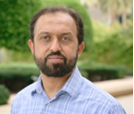On-Chip Antennas: The Last Barrier to True RF System-on-Chip
Antennas are integral part of wireless communication devices and traditionally have remained off the Integrated Circuits (ICs which are also commonly known as chips) resulting in large sized modules. In the last decade, the increased level of integration provided by silicon technologies and emerging applications at millimeter wave frequencies (such as 5G/6G) has helped to achieve true System-on-Chip solutions bringing the antennas on the chip. This is because antenna sizes at these frequencies become small enough for practical on-chip realization. Though, there are a number of benefits of putting antennas on-chip, such as monolithic integration resulting in compact systems, robustness due to absence of bond wires or other connection mechanisms between the antenna and the circuits, lower cost due to mass manufacturing in standard CMOS processes, etc. However, there are a number of challenges to overcome, for instance dealing with silicon substrate high conductivity and permittivity (resulting in poor radiation efficiency), metal stack-up and layout restrictions, and on-chip characterization through delicate probes, etc. Furthermore, the co-design of circuits and antenna, which sometime have contradicting requirements, need knowledge of both the domains. This talk aims to discuss the above challenges in detail as well as the proposed solutions. In particular, many design examples will be shown for the gain and radiation efficiency enhancement of on-chip antennas through artificial magnetic conductors. The talk will conclude with the upcoming trends in the field of on-chip antennas.
Date and Time
Location
Hosts
Registration
-
 Add Event to Calendar
Add Event to Calendar
Loading virtual attendance info...
- Contact Event Hosts
- Co-sponsored by University of Washington - Electrical and Computer Engineering Department, Washington State University - Electrical and Computer Engineering Department
Speakers
Prof. Atif Shamim
Biography:
Atif Shamim – received his MS and PhD degrees in electrical engineering from Carleton University, Canada in 2004 and 2009 respectively. He was an NSERC Alexander Graham Bell Graduate scholar at Carleton University from 2007 till 2009 and an NSERC postdoctoral Fellow in 2009-2010 at Royal Military College Canada and KAUST. In August 2010, he joined the Electrical and Computer Engineering Program at KAUST, where he is currently a Full Professor and Principal Investigator of IMPACT Lab. He was an invited researcher at the VTT Micro-Modules Research Center (Oulu, Finland) in 2006. His research work has won best paper awards in IEEE ICMAC 2021, IEEE IMS 2016, IEEE MECAP 2016, IEEE EuWiT 2008, first prize in IEEE IMS 2019 3MT competition and IEEE AP-S Design Competition 2022, finalist/honorable mention prizes in IEEE APS 2023, IEEE AP-S Design Competition 2020, IEEE IMS 2017 (3MT competition), IEEE IMS 2014, IEEE APS 2005 and R. W. P. King prize for journal papers in IEEE TAP 2017 and 2020. He has been selected as the Distinguished Lecturer for IEEE AP-S (2022-2024). He has won the Kings Prize for the best innovation of the year (2018) for his work on sensors for the oil industry. He was given the Ottawa Centre of Research Innovation (OCRI) Researcher of the Year Award in 2008 in Canada. His work on Wireless Dosimeter won the ITAC SMC Award at Canadian Microelectronics Corporation TEXPO in 2007. Prof. Shamim also won numerous business-related awards, including 1st prize in Canada’s national business plan competition and was awarded OCRI Entrepreneur of the year award in 2010. He is an author/co-author of 1 book, 3 book chapters and 325 international publications, an inventor on 35 patents and has given over 100 invited talks at various international forums. His research interests are in innovative antenna designs and their integration strategies with circuits and sensors for flexible and wearable wireless sensing systems through a combination of CMOS and additive manufacturing technologies. He is a Fellow of IEEE, founded the first IEEE AP/MTT chapter in Saudi Arabia (2013) and served on the editorial board of IEEE Transactions on Antennas and Propagation (2013-2019), IEEE Journal of Electromagnetics, RF and Microwaves in Medicine and Biology (2020-2024), and as a Guest Editor for IEEE AWPL Special issue (2019). He is currently the Vice Chair of IEEE APS MGA Committee and previously served on IEEE Technical committees on Antenna Measurements (AP-S), Microwave Controls (MTT-S 13), and Additive Manufacturing (CRFID).
Find out more details at https://cemse.kaust.edu.sa/impacts
Email:
Address:Thuwal, Saudi Arabia


